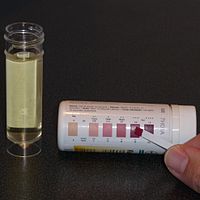
The effect of a mixture of Nigella sativa and Thymus vulgaris extracts in children with refractory epilepsies: A randomized trial
Sign Up to like & getrecommendations! Published in 2019 at "Journal of Herbal Medicine"
DOI: 10.1016/j.hermed.2018.10.007
Abstract: Abstract More than 25% of seizures in children are refractory to anti-seizure medications and need other modalities to control. Recently, herbal agents with anticonvulsive effects on seizure models in animals have received significant attention, but… read more here.
Keywords: nigella sativa; children refractory; vulgaris extracts; sativa thymus ... See more keywords

Intravesical botulinum-A toxin in children with refractory non-neurogenic overactive bladder.
Sign Up to like & getrecommendations! Published in 2022 at "Journal of pediatric urology"
DOI: 10.1016/j.jpurol.2022.02.007
Abstract: INTRODUCTION Overactive bladder (OAB) with urinary incontinence poses a potentially significant impact on daily activities and quality of life. OAB can be unresponsive to specific urotherapy and antispasmodic medication. Due to its successful outcomes in… read more here.
Keywords: oab; children refractory; bladder; non neurogenic ... See more keywords

The Ketogenic and Modified Atkins Diet Therapy for Children With Refractory Epilepsy of Genetic Etiology.
Sign Up to like & getrecommendations! Published in 2019 at "Pediatric neurology"
DOI: 10.1016/j.pediatrneurol.2018.12.012
Abstract: BACKGROUND The ketogenic diet is an accepted treatment modality in refractory childhood epilepsy. In this study, we analyzed the efficacy and tolerability of the ketogenic and modified Atkins diets in children with refractory epilepsy of… read more here.
Keywords: refractory epilepsy; etiology; children refractory; modified atkins ... See more keywords

The combination of clofarabine, etoposide, and cyclophosphamide shows limited efficacy as a bridge to transplant for children with refractory acute leukemia: results of a monitored prospective study
Sign Up to like & getrecommendations! Published in 2020 at "Pediatric Hematology and Oncology"
DOI: 10.1080/08880018.2020.1838012
Abstract: Abstract Clofarabine has been shown to effectively induce remission in children with refractory leukemia. We conducted a prospective trial (clinicval.trials.gov NCT01025778) to explore the use of clofarabine-based chemotherapy as a bridge-to-transplant approach. Children with refractory… read more here.
Keywords: clofarabine; children refractory; refractory acute; bridge transplant ... See more keywords

Infliximab as a second‐line therapy for children with refractory Kawasaki disease: A systematic review and meta‐analysis of randomized controlled trials
Sign Up to like & getrecommendations! Published in 2022 at "British Journal of Clinical Pharmacology"
DOI: 10.1111/bcp.15547
Abstract: Infliximab is a tumour necrosis factor‐alpha inhibitor that is used to treat children with refractory Kawasaki disease (KD). Our purpose was to evaluate the safety and impact of infliximab versus intravenous immunoglobulins on the incidence… read more here.
Keywords: kawasaki disease; infliximab second; refractory kawasaki; second line ... See more keywords

Reproducibility of interictal spike propagation in children with refractory epilepsy
Sign Up to like & getrecommendations! Published in 2019 at "Epilepsia"
DOI: 10.1111/epi.14720
Abstract: Interictal spikes are a characteristic feature of invasive electroencephalography (EEG) recordings in children with refractory epilepsy. Spikes frequently co‐occur across multiple brain regions with discernable latencies, suggesting that spikes can propagate through distributed neural networks.… read more here.
Keywords: children refractory; spike propagation; reproducibility; refractory epilepsy ... See more keywords

Children with refractory epilepsy demonstrate alterations in myocardial strain
Sign Up to like & getrecommendations! Published in 2020 at "Epilepsia"
DOI: 10.1111/epi.16652
Abstract: To test whether children with epilepsy have impairments in myocardial mechanics compared to controls without epilepsy. read more here.
Keywords: epilepsy; demonstrate alterations; children refractory; refractory epilepsy ... See more keywords

Vascular Reactivity Index as an Effective Predictor of Mortality in Children With Refractory Septic Shock
Sign Up to like & getrecommendations! Published in 2020 at "Journal of Intensive Care Medicine"
DOI: 10.1177/0885066620914850
Abstract: Background: Vasoplegia is vascular hyporesponsiveness to vasopressors and is an important phenomenon in children with refractory septic shock. This study aimed to develop an objective formula correlated with vasoplegia and evaluate the predictive power for… read more here.
Keywords: index; children refractory; septic shock; mortality ... See more keywords

Screening for Genetic Mutations for the Early Diagnosis of Common Variable Immunodeficiency in Children With Refractory Immune Thrombocytopenia: A Retrospective Data Analysis From a Tertiary Children's Center
Sign Up to like & getrecommendations! Published in 2020 at "Frontiers in Pediatrics"
DOI: 10.3389/fped.2020.595135
Abstract: Aim: This study aimed to identify common variable immunodeficiency (CVID) by high-throughput next-generation sequencing (NGS) in children with refractory immune thrombocytopenia (RITP) to facilitate early diagnosis. Methods: CVID-related genetic mutations were explored in patients with… read more here.
Keywords: variable immunodeficiency; diagnosis; children refractory; early diagnosis ... See more keywords

Improvement of intellectual outcomes in 20 children with refractory epilepsy after individualized surgery
Sign Up to like & getrecommendations! Published in 2018 at "Surgical Neurology International"
DOI: 10.4103/sni.sni_381_17
Abstract: Background: Refractory epilepsy is a common and troublesome neurosurgical disease. This study is designed to compare seizure control and degrees in intellectual outcome in children with refractory epilepsy after surgical treatment. Methods: 20 children with… read more here.
Keywords: epilepsy; surgery; intellectual outcomes; refractory epilepsy ... See more keywords